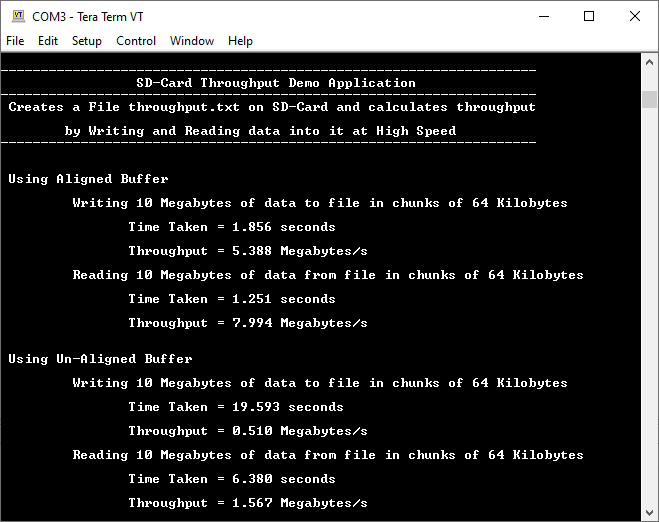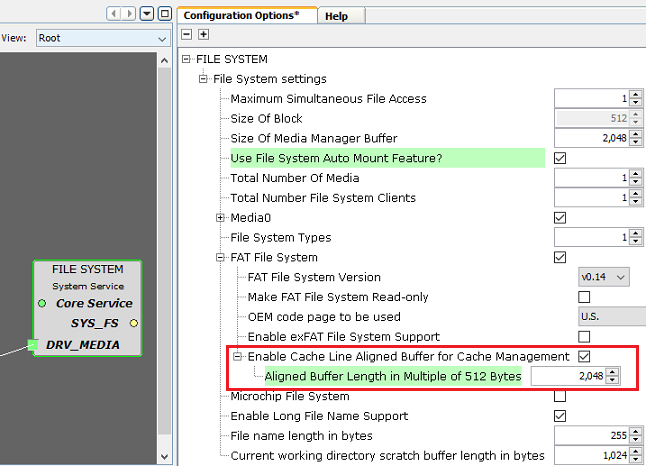FAT filesystem throughput using SDMMC Media
This application calculates throughput by Writing and Reading data into a Sd-Card at High Speed using the MPLAB Harmony File System and the SDMMC driver.
Description
Application performs below filesystem operations and throughput calculations on SD-Card using both Aligned and Unaligned buffers
- Opens a file named throughput.txt in the root directory of the SD card
- Writes 10 Megabytes of data to file in chunks of 64 Kilobytes
- Once the operation is completed it calculates the time taken and overall throughtput for write in Megabytes/second and displays on the console
- Reads 10 Megabytes of data from file in chunks of 64 Kilobytes
- Once the operation is completed it calculates the time taken and overall throughtput for reading in Megabytes/second and displays on the console
- Closes the file once read is completed
- Checks if the Above steps need to be repeated for Unaligned buffer. If already done then it Glows an LED reporting success and the console will have throughput information for both Aligned and Unaligned buffers.
File system layer uses:
- SDMMC Driver to communicate to SD Card
Downloading and building the application
To clone or download this application from Github, go to the main page of this repository and then click Clone button to clone this repository or download as zip file. This content can also be downloaded using content manager by following these instructions.
Path of the application within the repository is apps/fs/sdmmc_fat_throughput/firmware .
To build the application, refer to the following table and open the project using its IDE.
| Project Name | Description |
|---|---|
| sam_9x60_curiosity.X | MPLABX project for SAM9X60-Curiosity board |
Setting up AT91Bootstrap loader
To load the application binary onto the target device, we need to use at91bootstrap loader. Refer to the at91bootstrap loader documentation for details on how to use it to bootstrap the application binaries.
Setting up the hardware
The following table shows the target hardware for the application projects.
| Project Name | Board |
|---|---|
| sam_9x60_curiosity.X | SAM9X60-Curiosity board |
Setting up SAM9X60-Curiosity board
- Insert the SD card into SDMMC0 (J3) slot on the board (SD Card with FAT32 file system)
- The SD Card should have atleast 10MB of free space for the demo to work
- Connect the USB port J1 on board to the computer using a micro USB cable (to power the board)
- Connect the JTAG J12 on board to the computer using a JTAG based debugger
- Connect the J11 on board to the computer using a UART-FTDI cable (to enable debug com port)
Running the Application
- Open the Terminal application (Ex.:Tera term) on the computer.
- Connect to the COM port and configure the serial settings as follows:
- Baud : 115200
- Data : 8 Bits
- Parity : None
- Stop : 1 Bit
- Flow Control : None
- Build and program the application using its IDE
-
The LED is turned ON if there was no error during the file operations
Refer to the following table for LED name:
Board LED Name SAM9X60-Curiosity board RGB_LED(Green) - Calculated throughput values for Aligned and Un-Aligned buffers are dispalyed on console as below:
- Note: The Values showed in the below output may differ slightly when demo is run

Additional Steps (Optional)
To increase the throughput for the Un-aligned buffers you can follow below steps
-
Launch MHC for the project
- Increase the size for the internal aligned buffer used by Filesystem service with some value as shown below. This internal buffer will be used when application buffer is Un-aligned and placed in cacheable region.
- Note: Increasing the size of the aligned buffer will consume more RAM

-
Regenerate the project
- Once done repeat the steps mentioned in Running The Application and observe the change in throughput for Un-aligned buffer
